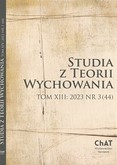Identity behaviours and perceptions of mixed marriages by young learners from Poland, the Czech Republic, Slovakia and Ukraine - A socio-pedagogical comparative study
Identity behaviours and perceptions of mixed marriages by young learners from Poland, the Czech Republic, Slovakia and Ukraine - A socio-pedagogical comparative study
Author(s): Ewa Ogrodzka-Mazur, Anna SzafrańskaSubject(s): Higher Education , Sociology of Culture, Sociology of Education, Identity of Collectives, Pedagogy
Published by: Wydawnictwo Naukowe ChAT
Keywords: cultural identity; identity behaviours; mixed marriages; young learners; Polish-Czech-Slovak-Ukrainian cultural borderland; comparative analysis in international studies;
Summary/Abstract: Pedagogical analysis of the issues addressed in the study adopts theoretical and methodological conceptualisations, referring to Paweł Boski's (1) theory of cultural identity based on values and practices in conditions of bicultural and multicultural socialisation, Tadeusz Lewowicki's (2) theory of identity behaviours, and (3) comparative analysis in international studies. The basis for outlining the sense of identity in local, regional, national, European and extra-European dimensions manifested by academic youth and their perceptions of mixed marriages was an international comparative study conducted from 2019 to 2021 in the Polish-Czech-Slovak-Ukrainian borderland. The analysis and interpretation of the collected empirical material indicate that – although there have been political transformations in the neighbouring countries, they cooperate in many spheres – both traditional ('constant') elements and new phenomena and processes, determined by the complexity and diversity of historical, cultural-social, cultural-personal and economic conditions, are preserved in the image of identity behaviour manifested by students today. These shape with particular intensity the cultural identity of young learners in the years of early adulthood.
Journal: Studia z Teorii Wychowania
- Issue Year: XIV/2023
- Issue No: 3 (44)
- Page Range: 99-114
- Page Count: 16
- Language: English

